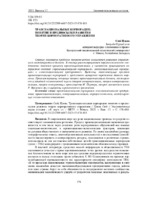Транснациональные корпорации: понятие и предпосылки развития теории корпоративного управления
Another Title
Transnational corporations: the concept and background of the development of the theory of corporate governance
Bibliographic entry
Цзинь, Сюй. Транснациональные корпорации: понятие и предпосылки развития теории корпоративного управления = Transnational corporations: the concept and background of the development of the theory of corporate governance / Сюй Цзинь // Экономическая наука сегодня : сборник научных статей / редкол.: С. Ю. Солодовников (гл. ред.) [и др.]. – Минск : БНТУ, 2023. – Вып. 17. – С. 178-185.
Abstract
Статья посвящена проблеме теоретического осмысления развития современного международного бизнеса. В статье рассматриваются терминологические особенности описания процесса транснационализации, в частности сравнивается содержание понятий «транснациональная корпорация», «многонациональная корпорация» и «многонациональное предприятие». Выделены отличительные признаки транснациональных корпораций и предложено авторское определение данного термина. Проанализированы основные теории транснационализации бизнеса, сложившиеся в западной экономической мысли (теория интернализации, теория интернационализации, теория конкурентных преимуществ М. Портера, теория жизненного цикла Р. Вернона и др.) и выявлены ограничения их применения.
Abstract in another language
The article is devoted to the problem of theoretical understanding of the development of modern international business. The article discusses the terminological features of the description of the process of transnationalization, in particular, compares the content of the concepts of "transnational corporation", "multinational corporation" and "multinational enterprise". The distinctive features of transnational corporations are highlighted and the author's definition of this term is proposed. The main theories of business transnationalization that have developed in Western economic thought (the theory of internalization, the theory of internationalization, the theory of competitive advantages of M. Porter, the theory of the life cycle of R. Vernon, etc.) are analyzed and the limitations of their application are identified.

